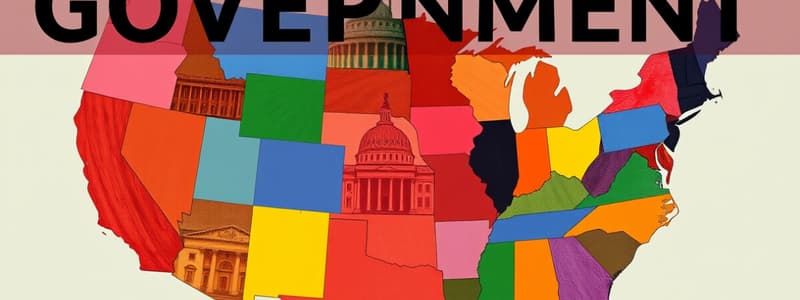Podcast
Questions and Answers
What is a State?
What is a State?
- A government with no borders
- An organization that enforces international agreements
- A defined border in which a government works within (correct)
- A territory without any laws
What is a Policy?
What is a Policy?
- An agreement made to reach a certain goal (correct)
- A rule made by an organization
- A law passed by the legislative body
- A decision made by a court
What does Government refer to?
What does Government refer to?
- A collection of laws
- Formal structures and institutions for making decisions (correct)
- A group of influential people in society
- An economic system in place
What is Legitimacy?
What is Legitimacy?
What is Sovereignty?
What is Sovereignty?
What does Social Contract mean?
What does Social Contract mean?
What is Liberal Democracy?
What is Liberal Democracy?
What is the Divine Right of Kings?
What is the Divine Right of Kings?
What does Liberty refer to?
What does Liberty refer to?
What does Self-Government mean?
What does Self-Government mean?
Which of the following describes a Federal System?
Which of the following describes a Federal System?
What is a Republic?
What is a Republic?
What is the most important function of government?
What is the most important function of government?
What do majority rule and minority rights pertain to?
What do majority rule and minority rights pertain to?
What were Hobbes' ideas about government?
What were Hobbes' ideas about government?
What did Rousseau believe about human nature?
What did Rousseau believe about human nature?
What was Locke's belief regarding natural rights?
What was Locke's belief regarding natural rights?
Match the following forms of government with their definitions:
Match the following forms of government with their definitions:
What is a disadvantage of the presidential system?
What is a disadvantage of the presidential system?
What is an advantage of the parliamentary system?
What is an advantage of the parliamentary system?
Flashcards are hidden until you start studying
Study Notes
Key Concepts of Government
- State: A defined political unit with established borders where a government enforces laws over its population.
- Government: A structured institution responsible for making decisions on behalf of a group of people.
- Legitimacy: The recognized right to govern by significant portions of a population.
- Sovereignty: Authority to govern and make decisions within a territory, including control over external relations.
Political Theories
- Social Contract: The concept that individuals surrender certain freedoms to create a government that provides protection.
- Natural Law: Universal rules derived from nature, asserting that certain rights cannot be violated.
- Liberal Democracy: A system ensuring the protection of individual rights for all citizens.
Economic Systems
- Free Enterprise: Economic freedom allowing individuals and businesses to make their own production, distribution, and exchange choices.
Governance Models
- Monarchy: A government led by a single ruler, typically a king or queen, holding supreme authority.
- Absolute Monarchy: A form of monarchy where the ruler's power is unlimited.
- Constitutional Monarchy: A monarchy where the ruler's powers are restricted by law.
Forms of Government
- Dictatorship: Governance by one person or a small group with absolute authority, often maintained through force.
- Totalitarianism: A political system where every aspect of life is controlled by the government.
- Oligarchy: Rule by a small, elite group, often rich and influential individuals.
- Theocracy: A system where religious leaders govern, and the state's power is derived from religious authority.
- Republic: A form of government where officials are elected to represent the people's interests.
- Direct Democracy: Citizens directly participate in decision-making, with authority held by the populace.
Democratic Principles
- Majority Rule: The principle that the option receiving more than half the votes prevails.
- Minority Rights: Protections for political rights of groups not in the majority.
- Rule of Law: A legal principle ensuring that both government and citizens are subject to the same laws.
- Compromise: A necessary process in decision-making where parties give up some demands to reach an agreement.
- Citizen Participation: Involvement of citizens in governmental processes is essential for a functioning democracy.
Functions of Government
- National Security: Primary responsibility of government to protect citizens from external threats.
- Conflict Resolution: Government mediates disputes to maintain peace and order.
- Common Good: Initiatives aimed at improving the welfare of the public.
- Order Maintenance: Implementation of laws and regulations to uphold social order.
- Provision of Services: Governments offer essential services that meet the public's needs.
Influential Philosophers
- Hobbes: Suggested that in a natural state, life is chaotic; people must give up freedoms for peace and security.
- Rousseau: Believed that people are inherently good but corrupted by society; governance should reflect the people's will.
- Locke: Advocated for the protection of natural rights, stating that rebellion is justified if the government fails to protect these rights.
Government Systems
- Federal System: A division of power between a national government and regional authorities.
- Confederal System: Independent states unite under a central government with limited authority, retaining control over their territories.
- Unitary System: A single central government holds the ultimate authority over all political subdivisions.
Challenges in Governance
- Presidential System: A system where a president is elected to share power with a legislative body, offering equal say among branches but potentially slowing law-making.
- Parliamentary System: Combines executive and legislative functions, where a prime minister is elected from parliament, facilitating quicker law-making but limiting the prime minister’s autonomy against parliament.
Modern Concept of "Public"
- Expanded to embrace inclusivity, recognizing diverse cultures and backgrounds in civil discourse and governance.
Studying That Suits You
Use AI to generate personalized quizzes and flashcards to suit your learning preferences.




